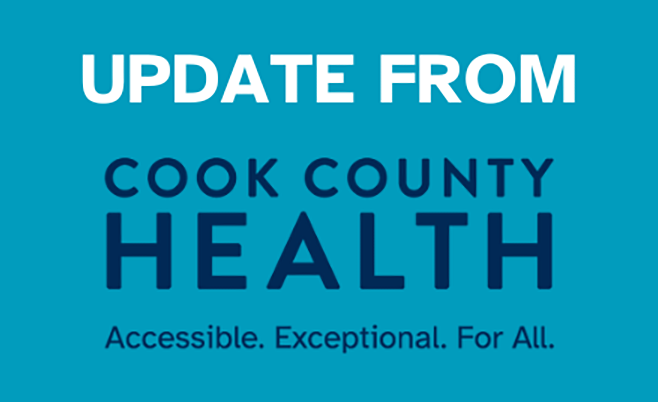February 13, 2018
Ruby Patterson was driving home from her job at Dominick’s when she had her first heart attack in 2007. She had a second heart attack last year.
Both heart attacks were found to be the result of congestive heart failure, which occurs when the heart muscle is too weak to pump enough blood as it should.
“I had no sense before this happened that anything was wrong with my heart, so it was very scary,” Ms. Patterson said. But she added, “God keeps smiling down on me.”
To prevent a third heart attack, Ms. Patterson now sees a team of doctors and nurses at Cook County Health’s John H. Stroger, Jr. Hospital. She regularly goes to cardiac rehabilitation at Stroger, where they educate her about healthy eating habits and do about an hour of exercise and stretching to build up her heart muscle.
Heart disease is the leading cause of death for both men and women in the United States. The Centers for Disease Control and Prevention estimates that 1 in every 4 deaths in America are the result of heart disease each year.
High blood pressure is a key risk factor. It causes an excess of strain on the heart’s coronary arteries, which leads to damage to the arteries over time and can ultimately cause a heart attack, heart failure and several other health issues.
The American Heart Association has changed its guidelines for what qualifies as high blood pressure, raising the number of Americans who are considered at risk for having a heart attack or stroke.
The guidelines now consider high blood pressure, also known as hypertension, to be a reading of 130 on top or 80 on the bottom. The standard used to be 140 over 90.
That means the percentage of U.S. adults with high blood pressure increased from 32 percent under the old definition to nearly 46 percent.
“As alarming as that is, there are a lot of steps you can take to lower your blood pressure if you’re found to be have high numbers under these new guidelines,” said Dr. Rami Doukky, Chief of Cardiology at Cook County Health. “Lowering your blood pressure can drastically reduce your risk of developing heart disease or having a stroke.”
Weight loss is one of the most effective lifestyle changes a person can make to control their blood pressure, Dr. Doukky notes. That’s because blood pressure often increases as weight increases.
“Losing weight and keeping it off can definitely be a challenge, but dropping your weight down by 10 pounds can significantly lower your blood pressure,” said Dr. Doukky.
The same can be said of regular physical activity – at least 30 minutes most days of the week. Dr. Doukky said exercise can help you avoid developing full-blown hypertension, if you have slightly elevated high blood pressure numbers. And if you already have high blood pressure, keeping your heart rate up on a regular basis can bring your blood pressure down to safer levels, Dr. Doukky said.
“The important thing is to keep up your exercise, so your blood pressure doesn’t increase again,” said Dr. Doukky.
Another step you can take to lower your blood pressure is to eat a healthy diet and stay away from salt.
“Getting lots of vegetables, fruits, whole grains and low-fat dairy not only can help you lose weight, but it also can drastically reduce your blood pressure,” Dr. Doukky said. “At the same time, you should avoid eating too much salt and minimize saturated fat and cholesterol from your diet.”
The Dietary Approaches to Stop Hypertension (DASH) eating plan has several tips on how you can eat a heart-healthy diet.
Quitting smoking and limiting the amount of alcohol you drink is also something you can do to reduce your high blood pressure, Dr. Doukky said. More than moderate drinking—one drink a day for women and two drinks for men—can raise blood pressure.
“To be sure, making lifestyle changes is no small feat,” he said. “The potential benefits, though, can be quite substantial.”

